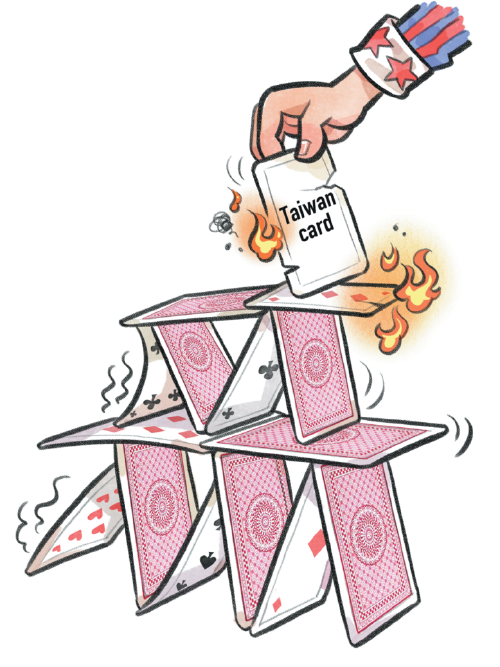
中国的统一是必然的 - 2024-01-30

After Democratic Progressive Party candidate Lai Ching-te and his running mate Hsiao Bi-khim won the leadership election in Taiwan recently, some foreign media began claiming the risk of military conflicts across the Taiwan Strait has increased.
China is a big country that has achieved rapid economic and social development, yet it has not realized national reunification. It wants to realize the reunification of the Taiwan island with the motherland through peaceful means, for example, by following the "one country, two systems" principle.
But "Taiwan independence" forces on the island have been opposing this with the help of some countries and by "internationalizing the Taiwan question". This has compelled Beijing to reiterate its position that it does not "renounce the use of force" to achieve the goal of national reunification.
The Chinese mainland has been making increasing efforts to settle the Taiwan question. Claiming Beijing has proposed to realize national reunification before the 100th year of the founding of the People's Liberation Army in 2027, the Taiwan authorities have alleged that the mainland would seek reunification using military force only in 2027. So they sought more help from the United States to prevent the inevitability of national reunification.
On its part, the US has been playing the "Taiwan card" and stirring up trouble across the Taiwan Strait. It has also been spreading lies that Beijing seeks to reunify the Taiwan island with the motherland through force before 2027.
The year 2027 marks the 100th year of the founding of the PLA, and Beijing has vowed to build the PLA into a world-class military by then. Is it wrong for a country to modernize its military and set special strategic goals?
Washington has been hyping up the Taiwan question and getting increasingly involved in cross-Strait affairs, in order to prevent not only the Chinese nation's reunification but also to distract the American people's attention from burning domestic issues such as a slowing US economy and the widening income gap.
What the US has said and done have greatly affected the judgment of the Taiwan authorities on how the mainland would deal with the Taiwan question. Such misjudgments by the Taiwan authorities and their subsequent moves have worsened the situation across the Strait.
One of the dirty tricks of the US in the "balance of military power game" across the Strait is increasing its arms sales to the island. The Joe Biden administration has announced 12 rounds of arms sales to Taiwan, including five in 2023. Although Washington knows that Taiwan, even with US military supplies, cannot change the cross-Strait strategic balance, it continues to sell weapons and military equipment to the island.
Worse, the US claims to help bolster Taiwan's defense and "boost its deterrence" against the mainland, sending the wrong signal to the "Taiwan independence" forces on the island. No wonder outgoing Taiwan leader Tsai Ing-wen said she is proud to spend large sums of money on buying US weapons.
The reunification of Taiwan with the motherland is an inevitable, and irreversible trend. It is only a matter of time before national reunification is achieved. But that does not mean there is a specific timetable for national reunification. That Beijing has vowed to achieve national reunification before 2027 is a figment of the US' imagination, even though the Chinese government and the Chinese people are determined, more than ever, to realize that goal. But the biggest obstacle to resolving the Taiwan question is the interference of the US. As long as the US adheres to the one-China principle, does not play the "Taiwan card", and stops selling arms to Taiwan and sending the wrong signal to the Taiwan authorities, the Taiwan question can be resolved through peaceful means.
A conflict cannot be ruled out if "Taiwan independence" forces go too far. But "peaceful reunification" based on the principle of "one country, two systems" remains the best way of resolving the Taiwan question.
The white paper titled "Taiwan Question and China's Reunification in the New Era", issued by the Taiwan Affairs Office of the State Council and the State Council Information Office in 2022 said, "the basic policy of upholding One-Country, Two-Systems", is to never "allow any person, any organization, or any political party, at any time or in any form, to separate any part of Chinese territory from China". The white paper also said, "China is firmly committed to peaceful development", and highlighted a series of measures to improve cross-Strait relations and realize peaceful national reunification.
But "Taiwan independence" forces have been opposing the mainland's call for peaceful reunification, challenging the one-China principle, and seeking the US' support to counter the mainland, thus poisoning cross-Strait relations. The newly elected leaders of Taiwan need to better understand the future path, and work for the benefit of the Chinese nation and people.
The author is Liu Qiang, the director of the academic council and a senior research fellow at the Shanghai Center for RimPac Strategic and International Studies.
Source: China Daily

